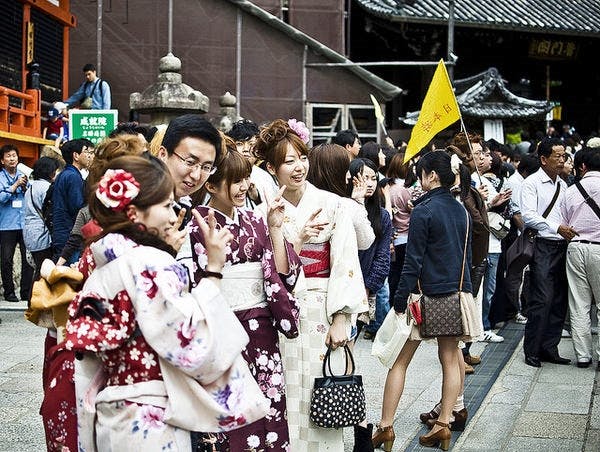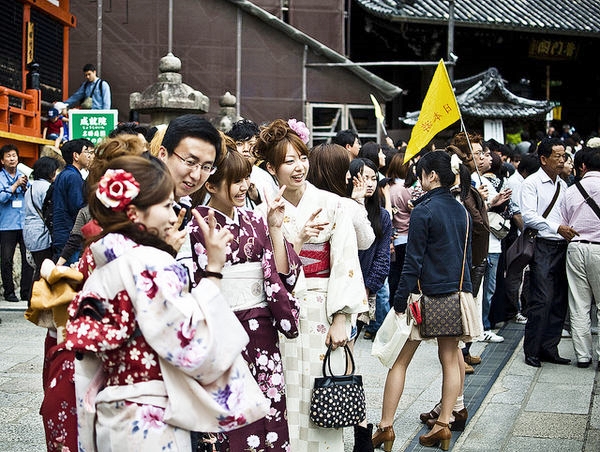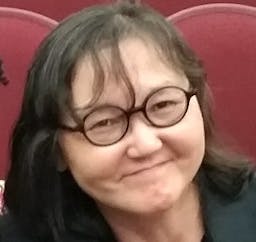Why is it difficult to stand up and voice opinions in Japan?
Jan 21, 2015
Story




Imagine you are being threatened by a group of people. They are after you for whatever you do or do not do, and they give constant criticism, make grumbling remarks, and express cynicism. Imagine you have done nothing to turn them against you. It is as if they all have an unspoken agreement. They speak badly behind your back and do everything they can to minimize your self-esteem. Daily, their enmity gets stronger and stronger. Finally, you bring the matter to an authority figure, a teacher or a supervisor, but they have no interest in helping you. In the end, you discover your voice means nothing, and you are entirely helpless.
This is what happens in Japan. It is called ijime. Elsewhere, it may be called bullying -- but it is worse than that. Japan has grown to become one of the most advanced nations, economically, socially, politically, and humanely. It offers numerous opportunities for education, employment, safety, good government, cheap goods and enough food, even a crime-free environment for every citizen. By the time Japan was fully advanced in 1980s, many people increasingly fall victim to the psychological torture called ijime, throughout Japan. With all this opportunity, many feel no hope for a bright future. Every year, children and adults seek counseling, and some even commit suicide because of ijime. Surprisingly, after remarkable economic development, professionals still cannot find solutions to reduce ijime. It is noteworthy that ijime is not gender biased: it is committed against both men and women, but most seriously affects children, who are largely defenseless. The impact of this trend is so severe that I have decided to speak up about ijime in order to let the international community to know about it.
Ijime is a form of psychological abuse that makes victims feel trapped, anxious, threatened, inadequate, and excluded by the people around them like classmates, co-workers, family members, friends, and their community. These victims receive a series of negative messages and actions of collaborative effort by a group of people, while no one else dares to defend them. Most ijime consists of blame, criticism, cynicism, scorn, mocking, verbal abuse, personal property damage, and sometimes even physical violence. However, it is not publicly recognizable because it is mostly concealed until the person speaks out. In many cases, encountering ijime reduces a victim’s confidence until they are voiceless and ineffective.
According to statistics from the Japanese Ministry of Education in 2007, there were 84,648 cases of ijime and 7.1 persons per 1,000 juvenile students were victims of ijime, while 40% of schools acknowledged that there were some kinds of ijime transpiring. It is also important to consider the hidden amount of ijime because many people do not report instances of ijime for fear of reprisal. According to the report, the highest rate of ijime occurred among students in junior high schools; and among junior high school students, the first year students reported 17,063 cases, which represent four times more than the sixth graders in elementary schools (4,262 cases) and tenth grade students (3,701cases). Between genders, 54.8% were reported by male students while 45.2 % were by female students.
One such example is the “Ijime incident of Ootsu, Shiga prefecture Junior high school in 2011.” The boy was 13 years old, and a student at the junior high school. In September, as school started, several students took the boy into the gymnasium and tied his legs with hair bands, put gum tape over his mouth and physically assaulted him. Many other students witnessed this ijime incident, but no one reported it nor tried to stop it. Time and again, the offending group of students asked the boy to practice committing suicide by making him stand close to the windows on high stories of the school. The following month, the abusers visited the boy’s home and stole money and other valuables. As a result, the boy sent an email to his tormenters saying that he would actually commit suicide. But the students did not take this threat seriously.
On October 11, the boy jumped from the top of a building and died without leaving any note behind. After the incident, the Board of Education and the classroom teacher claimed that they had not noticed ijime. Days later reporters found out that the Board had received a report of ijime 6 days before the incident, then the Board swore that ijime played no role in the suicide. Then it was unveiled that the teacher had taken no action to rescue the boy, but rather he asked the boy to endure ijime.
Note that the boy had been stigmatized throughout while no one rescued him from trouble. Some researchers think that ijime stems from scape-goatism, jealousy and irritations of abusers, but Mr. Kazuaki Izawa, an ijime guru running Let’s Protect Children from Ijime Network, nails down the hidden twist of the law. He dealt with 3,000 cases of ijime since 2007 and, when interviewed, he stated, "Universal Declaration of Human Rights rendered by United Nation had been wrongly interpreted in Japan that from the time installed onward children have been allowed to do whatever they wanted in the classroom. The law was originally meant to protect the children from harm but ironically created more harm to the victims of ijime. Thereafter, teachers are not scolding children but pretending that nothing is wrong, and trying to make peaceful outlook when it is not." To make the matter worse, ascribing ijime became far common against those who violate the (unspoken) codes of conduct,. This leads individuals to feel strong aversions for acting against a group they belong. For the Japanese, it is a social taboo for an individual to stand out from the rest. It is also said that, based on Buddhist philosophy, people should make humbleness, harmony, and non-aggression the priority—which also leads to victims not speaking out.
Lack of identity, in addition to the steady projection of oneself with the group, confirms strong work ethics in the cooperative world of Japan. But that also means that no one ever articulates ones’ thoughts and opinions apart from groups. As a result, people tend to think alike or simply follow their elders or authorities. Sometimes, in this system, no one has the courage to voice what is right. They are too likely to be criticized by others who prioritize fitting in with the group.
In such an environment, wrong assumptions are common. The term used to describe this psychological phenomenon is called Groupthink, in which “the desire for harmony or conformity in the group results in an incorrect or deviant decision-making outcome. Group members try to minimize conflict and reach a consensus decision without critical evaluation of alternative ideas or viewpoints, and by isolating themselves from outside influences.”
If you would like to expose ijime in Japan, try your hand in entry level jobs where you know no one and let yourself appear inexperienced. Make sure that people do not expect you to voice your opinions because you are helpless and dependent. To make my point, I would like to describe my own experience. I once took initiative by working part time in an office, where two female workers were to hand over the office work to me and teach me how to manage the computer in the office. Since I had the experience of writing and publishing newsletters through my NGO, typing on the computer was not a difficult task for me, but I did not disclose this.
Soon, despite all my genuine effort, even a minor error was evaluated as highly unforgivable by the other women. They turned against me and argued that I was entirely useless. Behind my back many hurtful rumors were being circulated in the office. These women continued with their bad behavior. Once, a supervisor even interrupted to stop our arguments. I expected reasonable judgment from her as a superior, but surprisingly, the supervisor only listened to their side of the story and believed that I was not a good fit for the job, without fair evaluation. By this time, I felt pretty bad, but not to the extent that I lost faith in my skills. With all of my experience publishing work with the computer, I could make a reasonable judgment of the matter—it was clearly identifiable that the whole drama was ijime.
As in this example, ijime destroys the soul of those who would otherwise contribute greatly to the society. No one dares to rescue the poor victim because the victim is in a helpless spot, where she has no power. For example, she has no higher authority or command in her particular context; she is new and inexperienced. Some individuals do not face ijime because he or she exhibits specialized irreplaceable knowledge or abilities.
If you are a good communicator, that often saves you from ijime. In my case, I presented my previous computer work to my superior and refuted the claim that I couldn’t manage a computer. Furthermore, I went to discuss the matter with the top super-intendant. Obviously the super-intendent was not happy that the work environment did not encourage the morale of workers. In addition, she criticized the supervisor for telling me that I should quit the job. She was particularly unhappy when she discovered that eligible workers frequently left the company because of ijime, and the supervisor made no effort to provide a comfortable place for them.
To solve the problem of ijime, the key is to be very patient. Do not respond with hatred or ill manners. It is best to keep quiet until the right time to speak to the right person. In the meantime, remind yourself that it is a phenomenon, not personal. Rather, it is the result of not wanting to have different opinions from the group—whether it is right or wrong. Those who are targeted have the following characteristics:
- New to an environment and in need of assistance.
- Lacking knowledge of do’s and don’ts, or how to fit into the in-group culture.
- Lacking power like special knowledge or powerful contacts.
In search of a solution to ijime, I interviewed Ms. Okada Akiko, a managing director of Kotoji, a psychological community center under Aizato hospital for the victims of ijime located in Tokushima. The center deals with approximately 70 to 80 patients at a time who suffer from serious depression, schizophrenia, and emotional problems caused by ijime. The victims had been excluded from social activities, ignored, criticized behind their backs; while working, they were not properly included, or they were forced to work after hours. Ms. Okada said that most patients do not know the reason for their abuse nor have they confronted their abusers. Most victims refused to go to schools or jobs where ijime occurred. Kotoji offers counseling, rehabilitation, group therapy, and medical therapy. Within a safe environment, patients gradually gain back confidence in social interactions.
Bullies exist in all countries, but the ijime phenomenon is unique in a way that corners individuals not to speak out against it. I asked Ms. Okada “Why does ijime occur in Japan?” She said, “We don’t know…perhaps Japan has enough wealth and people do not have any meaningful things to do.” She agreed that ijime may be the product of group orientation as well. She said, “People want to belong to groups but they do not want to be opposed to, or stand out from the group. So they keep quiet.”
Ms. Okada believes that it is healing for patients to do some activities for the poor in the world. “Directing their attentions from ijime to the needy in Africa, they (the patients) may feel that they are needed and wanted.” She implied that the patients’ depression comes from a lack of feeling that they are needed and wanted. I told her that Nigerian women and children would deeply appreciate their activities to help the poor. As a result, the discussion with Ms. Okada ended with the empowering agreement that our NGO, Support Women and Children in Nigeria (SWACIN) and patients in Kotoji will work together to collect some unwanted materials this year and send them to women and children in Nigeria.
This article is part of a writing assignment for Voices of Our Future a program of World Pulse that provides rigorous digital media and citizen journalism training for grassroots women leaders. World Pulse lifts and unites the voices of women from some of the most unheard regions of the world.




